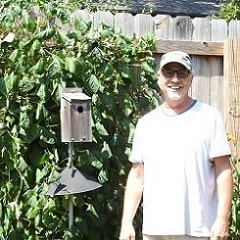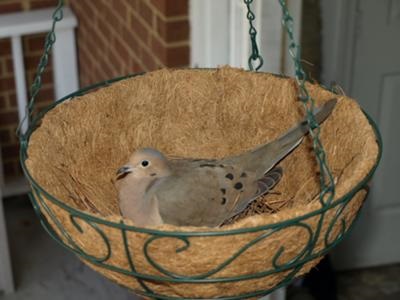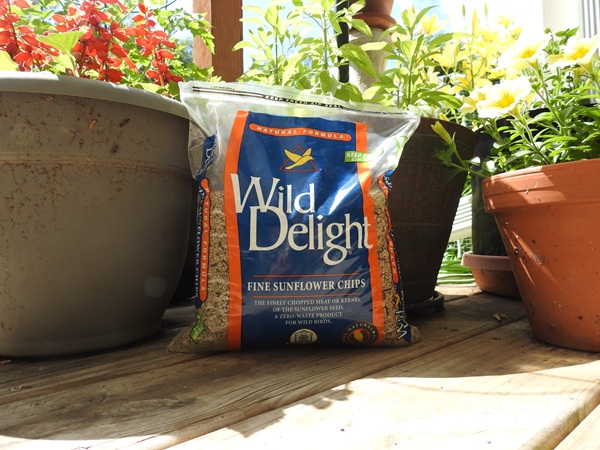What do I do Found Bird Egg, No Nest How Do I Care And Get The Egg To Hatch
Each breeding season, questions about finding an abandoned bird egg on the ground, and with no nest to be found, arrive in my email box.
The question becomes, "What do I do to care for the egg I found, and can I get it to hatch?"
We understand this question comes from those that care about our backyard birds.
Unfortunately, the answer is not a simple step-by-step guide to hatching them.
Did you know that in most cases, it is even illegal to have a wild bird egg?

Two Barn Swallow Eggs
These laws are there to protect birds. Believe it or not, in some countries, wild bird eggs are sold to restaurants to be used in exotic dishes.
With the exception (in the US) of European Starlings, House Sparrows, and Pigeons, any possession of eggs, feathers, nests, or birds would violate the Migratory Bird Treaty Act.
If the species is not protected, we have advice on candling and hatching bird eggs in this article.
But I Care About The Baby Bird Inside!
So do we. Hatching to fledgling is not as simple as it appears. There are several things to consider.
What Does it Take to Hatch an Egg?
Temperature, humidity, and turning of the egg all play a part in getting a bird from the egg to fly free in the wild.
Most wildlife rehabilitators are loaded down caring for injured and orphaned animals and birds.
It doesn't hurt to check with local Rehabbers just in case they will take on the challenge of incubating a wild bird egg.
On average, an egg needs to have a constant temperature of 100 degrees Fahrenheit to hatch.
Turning the egg to prevent overheating needs to be done several times daily throughout the incubation time.
Humidity is also important during incubation. This varies between 25-60 percent, increasing to 70-80 percent for the last 3 days.
Providing all these requirements is more than most people can do without specialized equipment.
Keep in mind, this is a 24-hour period. Getting up during the night included.
Most bird eggs you find will not be viable, and your time may be for nothing.
Eggs are fragile, while there may not be any visible cracks on the eggshell, an egg dropped on the ground is most likely no longer a viable egg.
The membrane inside may be damaged, causing harm to the embryo.
As stated before, temperature plays a major part in whether an egg will hatch.
An egg left to cool once the incubation process has been started can spell disaster for the egg.
When and where you find the bird egg can be significant in the egg's viability as well.
Predators often drop eggs or place them somewhere.

3 House Sparrow Eggs
Often leaving them because of harassment from other predators or adult birds attacking them.
How long the egg has been left in the open can be a determining factor in whether the egg can hatch.
It doesn't take much rain, sun, or cold to damage an egg.
Even if you get the egg to hatch, the young nestling would still face a slim chance of survival.
Once the young leave the nest, they continue to learn what to eat and what predators to watch out for from the adult birds.
There is no way humans can teach them these survival skills. This may cause them not to make it through their first winter.
Feeding a nestling would require a commitment of 16 hours a day, 7 days a week, for 2 weeks on average.
The dietary needs of baby birds vary with species.
Most birds do not eat earthworms. Most require a variety of insects delivered several times each hour of the day.
The primary purpose of this page is to give you an understanding of why you should not attempt to hatch an abandoned bird egg.
At first, it seems as though it should be a simple process of just keeping the egg warm until it hatches.
But as you can now understand, wild birds have a huge job getting their young from egg to fledgling.
Is the Found Bird Egg Really Abandoned?
Make sure if you come across a nest with eggs that they have been abandoned.
Many birds do not begin incubation until all or most of the eggs are laid.
Most songbirds lay 1 egg each day, usually in the early morning. Then she will leave to feed the rest of the day.
When she lays the last or next to the last egg, incubation begins.
Keep in mind, she will leave the eggs from time to time to feed herself. Sometimes the male will bring food for the female while she incubates.
In some species, like Mourning Doves, the male helps with incubation.
So What Can You Do When You Find A Bird Egg?

Dove Egg with One Hatching
The best thing you can do is respect the Migratory Bird Treaty Act and leave the egg alone. In most cases, it is unlikely the egg would hatch.
If you know the egg is from a rare or endangered species, call your state fish and wildlife agency or a wildlife rehabilitator.
Do not place a bird's egg in the nest of another bird.
Just because you may have Wrens nesting in a birdhouse does not mean they'll raise a Robin or Chickadee.
Finding an egg that doesn't belong in the nest may cause abandonment of the entire nest.
This means instead of one egg not hatching, you are responsible for 4 to 6 eggs not hatching.
Exceptions for Purple Martins or birds of the same species do exist. But never with different species.
Why Bird Eggs are on the Ground or Abandoned
Some of the reasons you may come across bird eggs on the ground or abandoned in the nest might surprise you.
The obvious ones are storms, high winds, and some types of human activity, such as removing shrubs or trees.
But sometimes it's because of natural bird behavior.
Did you know that the common Cowbird does not build nests? Instead, they lay their eggs in the nest of other birds.
The Cowbird will remove or pierce an egg or two of the nest owner's eggs. Some birds can't tell the difference between Cowbirds and their eggs.

15 Quail Eggs in a Ground nest
Some birds know that an egg isn't their own and will remove the egg by pushing it out or carrying the egg away and dropping it somewhere else.
Should I Remove An Unhatched Egg?
Birds will realize at some point whether their egg or eggs are fertile or not. If it's a single egg, they may just remove it.
However, if the whole clutch doesn't hatch over some time, they may just abandon it all and begin again somewhere else.
Nest and egg abandonment is sometimes due to predator attacks or other security issues.
Sometimes it's because the female may have come to some type of harm.
While some male species of birds have a brooding patch to incubate eggs, most do not, and the male is incapable of hatching the eggs.
There's no good reason for us to decide whether to remove unhatched eggs. After the season is over, you can decide if the egg is still there.
Nature also provides ways of cleaning out the old nests with snakes, raccoons, and others.
Summary
While it is always a disappointment to find a bird egg left or abandoned in a nest, sometimes there is little more we can do but accept that this is a part of nature.
Birds themselves are the best resource for incubating, hatching, and raising young nestlings.
Recommended





